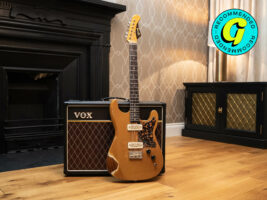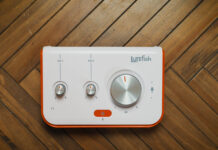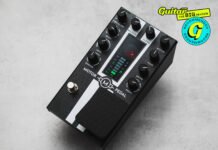
Kithara Luthier Reserve Harland Baritone review – a reminder of what boutique guitars are supposed to be for
From £2,799, kitharaguitars.com
Handcrafted in Belfast Northern Ireland, Kithara Guitars is fast establishing a reputation for creating unique hand-crafted instruments that are tailored to a buyer’s specific needs. It’s an approach that has won Kithara fans in the shape of The Bros Landreth, Ariel Posen and even some guy called Lewis Capaldi.
READ MORE: Fender Tom DeLonge Starcaster review – a stripped-down rock machine that’s more versatile than it looks
Here we have a textbook example of the kind of unconventional instrument that Kithara is capable of offering – it’s a twist on the brand’s vaguely S-type Harland model, but instead of the regular instrument, here we have an instrument fitted with 0.17-inch baritone strings and tuned to B, but it’s just a 25.5-inch scale length – aka standard Fender scale. Oh and if that wasn’t weird enough, we also have a built-in fuzz circuit and a set of gold foil pickups made by the UK’s own Mojo Pickups that emulate those found on a 1960s Zenon guitar.
This lightweight alder body is dressed in a heavily aged amber nitro finish, with a beautiful tortie scratchplate and stepped headstock insert, plus a stunningly dark Indian rosewood board. The ageing is perhaps more ‘artistic’ than ‘authentic’ but on a guitar such as this – which is never going to be mistaken for a vintage guitar – it just adds to the sense that you’re getting something that’s a bespoke piece of art than something that’s come off a production line.
Image: Press
A 25.5-inch baritone, how does that work?
As it turns out – rather well! The compact scale and 12-inch radius on the ’board are clearly designed to give a more accessible vibe than a regular baritone guitar, which usually top out somewhere between 26 and 29 inches on the scale length front.
Any playability concerns with those thick 17 gauge strings melt under the fingertips – lead lines and even whole tone bends are reassuringly easy to play on the shorter scale length, and it’s not too floppy under the hands either. As we plug the guitar into our trusty Deluxe Reverb, it amazes us how even our same old chords and licks take on a fresh new sonic identity played in the lower register of a baritone tuning. It’s probably the most approachable and easily navigated baritone I’ve ever played.
Image: Press
How do the gold foil pickups sound?
I mentioned up top that the Mojo pickups on board the Harland are based on old Zenon units, and these are super low output, measuring roughly 3.5K in the neck and 4.5K on the bridge. Set in their beautifully art deco-esque housings, they look as delicate as they can sound when you want them to.
The Harland’s snappy attack and sweet gold foil tones lends itself perfectly to deep arpeggiated chords laced with reverb and tremolo sounding epic and widescreen. Adding some amp drive and delay brings us deeper into atmospheric ambient soundscape land, we’d love to create a movie soundtrack with the vast array of tones this instrument creates.
Image: Press
What’s the deal with the built-in fuzz?
Ah yes, I mentioned it can sound delicate and lovely when it wants to, but neither of those words seem compatible when you also include the words ‘built-in fuzz’. In the Harland’s case we have a circuit made by another UK boutique builder, NRG Effects – it’s a nice indication of the spirit of collaboration and shared creativity that makes the boutique scene so interesting.
Flicking the switch to engage the fuzz circuit you are greeted with a snarling wall of unapologetically thick fuzz accompanied by a phenomenal jump in output level that could catch you – or your amp’s speaker – unaware without caution.
However, utilising the guitar’s onboard volume control along with the fuzz’s bias and output level controls gives me complete control of output level and puts every rich fuzzy texture I could imagine – from fuzzy overdrive to full-on spitty gated velcro fuzz chaos and all points in-between – at my fingertips. Combined with the rich range of a baritone, it’s an extraordinary sonic experience.
Image: Press
Should I buy the Kithara Harland?
Undoubtedly, the Kithara is a fine instrument that speaks volumes to the skill and creativity of its maker, Chris Moffitt. By bringing together superb build quality with an original design, the Harland is one of those rare inspiring instruments that challenges you to make music rather than play your same old clichés. Obviously, this isn’t a guitar that most of us are going to be on the market for before reading this review – and that’s perhaps something instructive in and of itself.
There are an awful lot of boutique luthier guitars out there that are fantastic instruments, but stick pretty rigidly to the crowd-pleasing shapes and configurations that were set in stone by Gibson and Fender nearly 70 years ago. This isn’t a dig at the makers who produce these guitars of course – they’re making the instruments that people want after all – but it is perhaps a reminder to those of us who are in the privileged position of being able to afford a luthier-built instrument.
The whole point of boutique guitars is that you don’t have to stick to the classics – as this wonderful instrument demonstrates, sometimes the most fun can be had when you allow yourself to colour outside the lines and try something a little left-field. And if that isn’t the whole point of boutique guitars, then what is?
Kithara Harland alternatives
There are quite simply not any other 25.5-inch baritones with gold foils and a built-in fuzz out there, of course, but there are plenty of interesting boutique luthiers doing unconventional and unique things with guitars. Trent Guitars, based in Dorset, UK, offers unconventional looks, a huge amount of personalisation options and eco-friendly finishes at a remarkably affordable price. Also in the UK, Matt Oram’s Fidelity Guitars are some of the most unique and yet playable and usable electric guitars in the world. Heading over the Atlantic to Ontario, Canada, it’s hard not to fall in love with what Frank Brothers have been doing over there.
The post Kithara Luthier Reserve Harland Baritone review – a reminder of what boutique guitars are supposed to be for appeared first on Guitar.com | All Things Guitar.
Source: www.guitar-bass.net













